How do Connecticut’s citizens balance change and continuity to reconstruct robust civic engagement in an age of unique challenges to our very democracy?
Connecticut has a centuries-long civic tradition that has inspired and informed the rights of individuals and the electoral process.
The Fundamental Orders of 1639, the Connecticut Compromise of 1787, the Constitution of 1818, and the Connecticut Constitutional Convention of 1965 represent both electoral milestones in the state’s history and key elements of the governing foundation of the United States. While on the vanguard of representative government for nearly four hundred years, Connecticut is also slow to change. Known as the “Land of Steady Habits,” the state enters the 21st century as a racially and ethnically diverse, economically bifurcated, and fiscally challenged state.
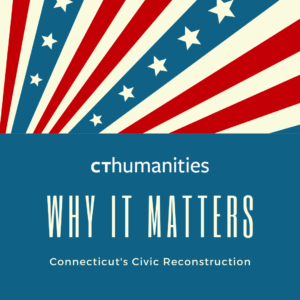
Connecticut Humanities Thanks
CT Public, HartBeat Ensemble, Democracy and Dialogues, Connecticut Democracy Center, and Everyday Democracy for partnering with us on this important project.
The programs below are generously funded by the “Why it Matters: Civic and Electoral Participation” initiative, administered by the Federation of State Humanities Councils, and funded by The Andrew W. Mellon Foundation.
About the Initiative
We endeavor with our partners to provide frameworks for meaningful discussion around often difficult and divisive topics, instruction on civic processes and participation, and avenues that ensure access for all citizens to value and participate fully in our democracy.
We aim to:
- further public knowledge and awareness of Connecticut’s crucial role in the creation of American democracy,
- explore the importance of civic engagement and how it affects us personally and collectively, and
- raise awareness that voting does not equate to civic engagement but rather is one critical expression of it.
Programs
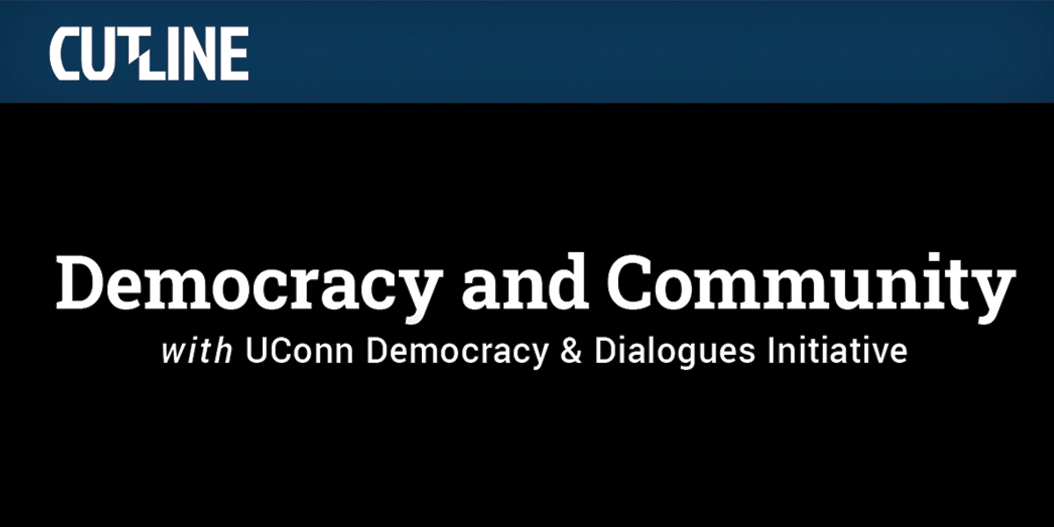
Democracy and Dialogues Initiative: What do we want our democracy to look like?
The present historic moment demands robust participation in our political system and commitment to the values on which it was built. How can we support participation by all members of our community?
Join us for a facilitated group discussion with UConn Democracy and Dialogues Initiative on ideas for the future of democracy in Connecticut.
CUTLINE Democracy and Dialogues Initiative features conversations exploring our experiences, concerns, aspirations, and ideas for the future of democracy.
Premieres
Sunday, March 28
10 a.m. on CPTV
Where to Stream:
Each episode will be available for on-demand viewing concurrent with its television premiere. Episodes will be available at ctpublic.org, as well as at video.cptv.org; on YouTube; and on the free Connecticut Public mobile app. (Visit Google Play or the Apple App Store to download the app.)
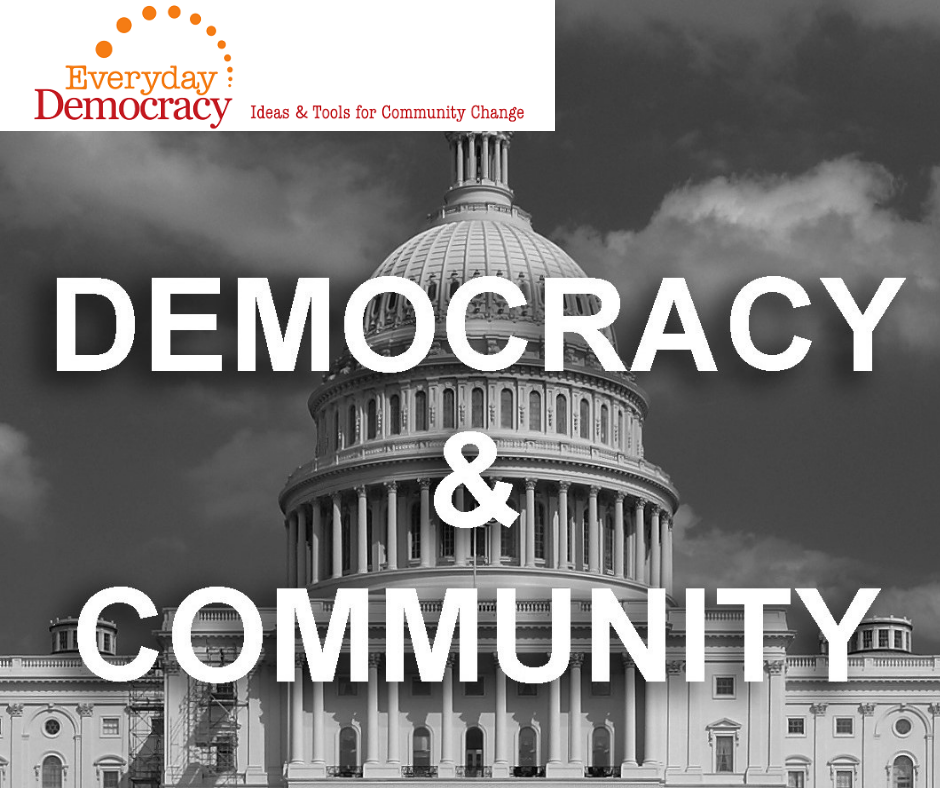
Civic Ambassadors: Fishbowl Dialogue
Everyday Democracy and CT Civic Ambassadors hosted Democracy and Community, a fishbowl-style dialogue to be broadcast as part of CT Public’s Cutline series.
Designed and facilitated by the Democracy and Dialogues Initiative at UConn, this conversation featured voices from around the state discussing the challenges and opportunities for building a more inclusive, just, and effective democracy in Connecticut. A model for renewing civic discourse at the community level – resources and supports for organizing and hosting similar dialogues will be made available.
March 11, 2021

Democracy & Dialogues Initiative: Facilitator Training
Encounters is a structured-dialogue model that allows participants to come face-to-face and converse about issues that matter in their community. Encounters dives deeply into subjects through facilitated, small-group dialogues followed by a “question and answer”-style conversation with content-area specialists.
Encounters team members facilitated a “how-to” training for those interested in implementing this model in communities anywhere and everywhere. The event was free and open to the public.
Hosted by UConn’s Democracy & Dialogues Initiative and UConn Hartford.
February 25, 2021
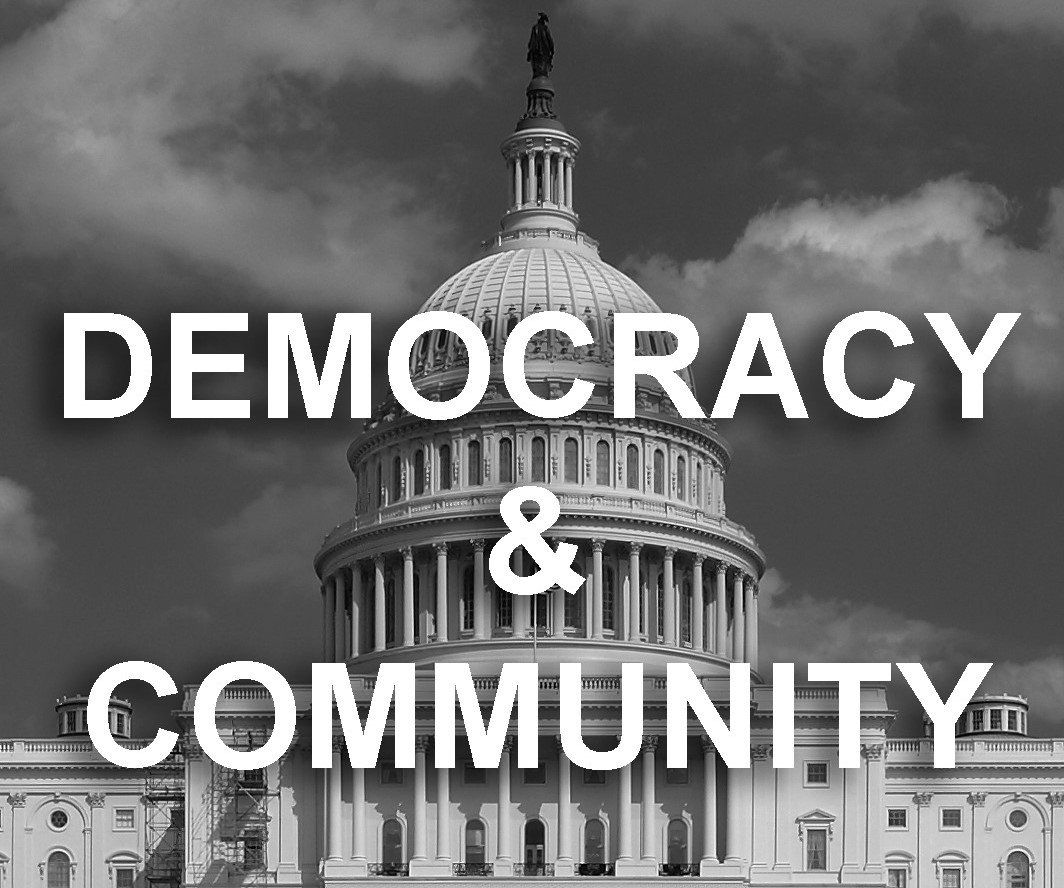
Democracy & Dialogues Initiative: Democracy & Community
The present historic moment demands robust participation in our political system and commitment to the values upon which it is built. But what do we want our democracy to look like? How can we support participation by all members of our community in the work of self-government? This small group facilitated conversation explored our experiences, concerns, aspirations, and ideas for the future of democracy.
After a short introduction and orientation by the organizers, each participant was randomly assigned to a breakout group to dialogue with other members of the community, guided by a trained facilitator. The conversation was broken up into rounds allowing exploration of various aspects of our theme. At the conclusion of those rounds, all participants reconvened and each breakout group shared highlights of their conversation with the larger group.
February 16, 2021
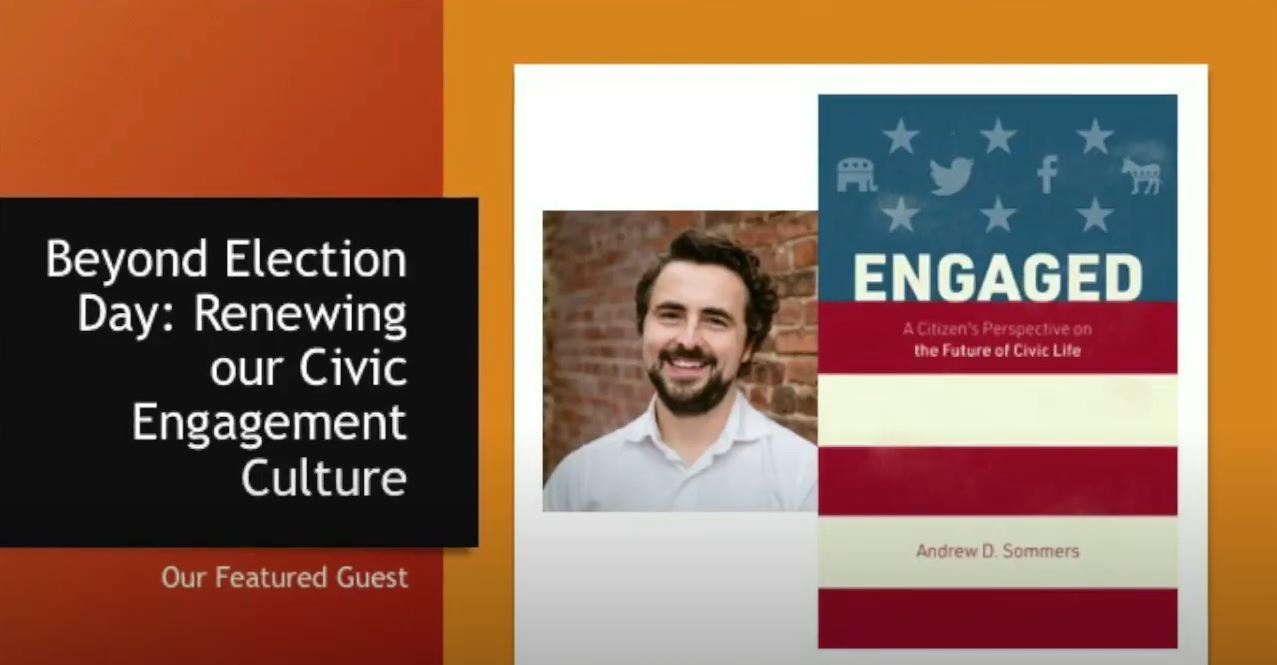
Beyond Election Day: Renewing our Civic Engagement Culture
What is the cure for the post-Presidential Election blues?
The answer: an interesting and lively conversation with author Andrew Sommers, whose book—Engaged: A Citizen’s Perspective on the Future of Civic Life—tells us that there is much more than voting on Election Day that we can do to participate in our democracy every day.
Our conversation with Andrew Sommers is designed for all Americans — veterans, entrepreneurs, religious leaders, community organizers, educators, parents, and everyday citizens — who want to make a difference in the country we all love.
This event will inspire you to reach out to others–even those who may have voted differently than you — to work together toward renewing our culture of civic engagement. Learn about the many ways that you can be part of strengthening our democracy and improving the quality of life in our communities.
Held on December 3, 2020 – watch recording here.

Live Stream: American Dreams
American Dreams, a production by NYC’s Working Theater, is a virtual, interactive theatre experience like no other! See the trailer here.
Running October 27- November 1, at HartBeat Ensemble, YOU got to decide the fate of three immigrants; who wins American citizenship…and who gets a one-way ticket back home?
Tickets were “pay what you want.”
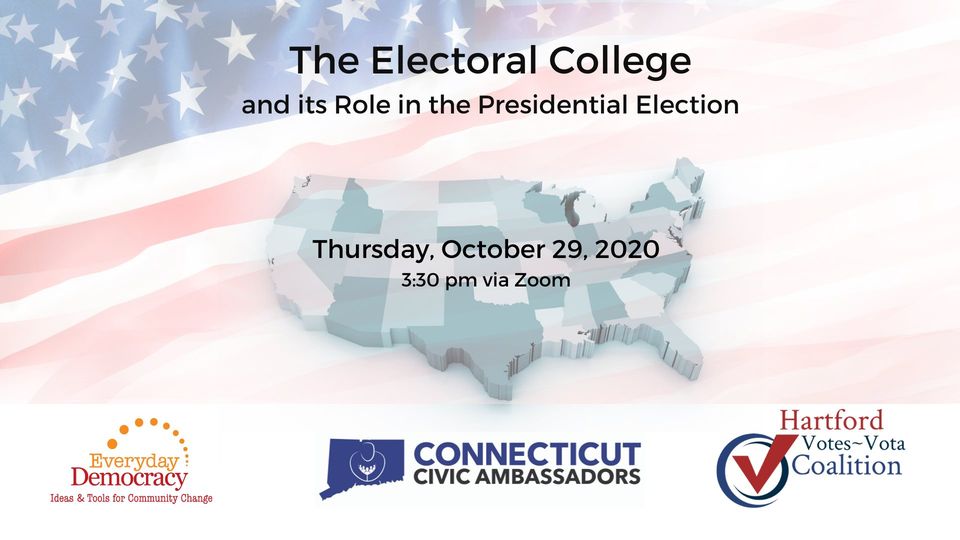
The Electoral College and its Role in the Presidential Election
How does your vote count?
From the basics of what the Electoral College is, to what role it may play in the upcoming election, this online panel discussion provided different perspectives on this process that directly impacts who leads our nation.
Hosted by Everyday Democracy.
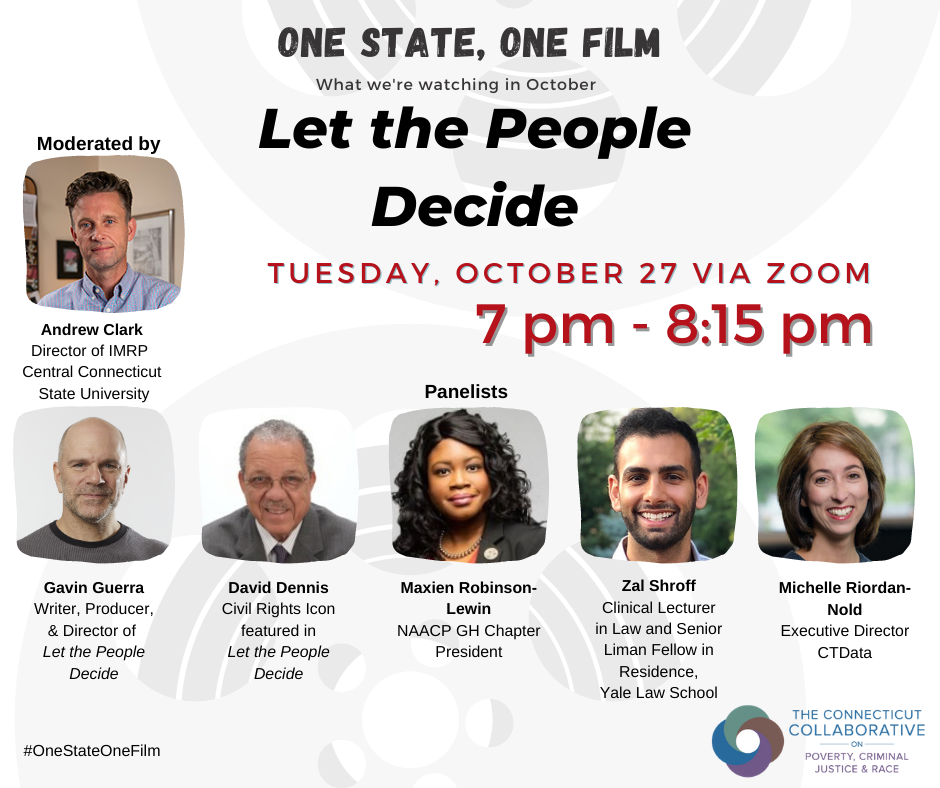
One State, One Film: "Let the People Decide"
Programming included a discussion of Let The People Decide, a powerful documentary about the struggle for voting rights from the 1960s until today. The film features interviews with Rep. John Lewis, Rev. Dr. William Barber II, Harry Belafonte, and generations of activists, scholars, and political figures.
Everyday Democracy and the Connecticut Collaborative on Poverty, Criminal Justice & Race presented this program about voting rights.
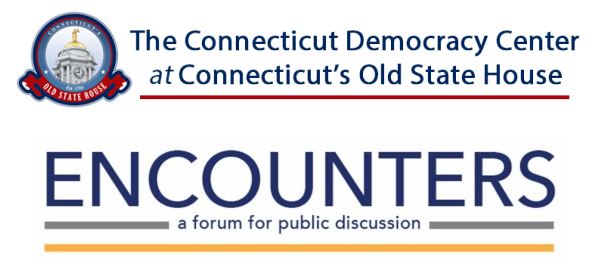
Encounters: From Suffrage to Election
Following the passage of the 19th amendment, thirty-four women ran for office; five were elected to Connecticut’s General Assembly in 1920. Since that time, the number of women serving in elected office has risen steadily. Why are the numbers of elected women still low in comparison to their percentage of the population? How does gender balance impact legislative decisions?
A small group discussion of these issues featuring Patricia Russo from The Campaign School at Yale, CT Rep. Gail Lavielle 143rd district, and Kathy Fischer of UConn’s Women’s Center was co-sponsored by CT Humanities, The Campaign School at Yale University, UConn Women’s Center, UConn’s Humanities Institute, the Hartford History Center, Hartford Public Library, the Wadsworth Atheneum, Akomawat, and UConn’s Thomas J. Dodd Center.
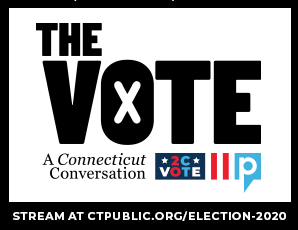
The Vote! A Connecticut Conversation - Stream On-Demand
Explore voter rights, voter trust, a voter registration drive, and the voting process in Connecticut, with a focus on Black and Latino voters.
This was an election like no other. The coronavirus pandemic had drastically reshaped our lives — from how we work, how we teach our children, how we socialize, and, yes, how we vote.
Across the country, and across Connecticut, residents were grappling with not only which candidates to vote for, but whether to vote in person, by mail, on election day, or long in advance. Election workers and public officials were struggling to keep up with the changes brought upon us by the pandemic. And all of this affected different members of our diverse communities in different ways.
Hosted by John Henry Smith, The Vote! A Connecticut Conversation put the candidates for public office aside and looked at how voting is changing, who is affected by it, and what we are doing to make sure that our election systems will produce results.
This original program from Connecticut Public premiered Thursday, October 15, 2020. It is now available to stream online.





